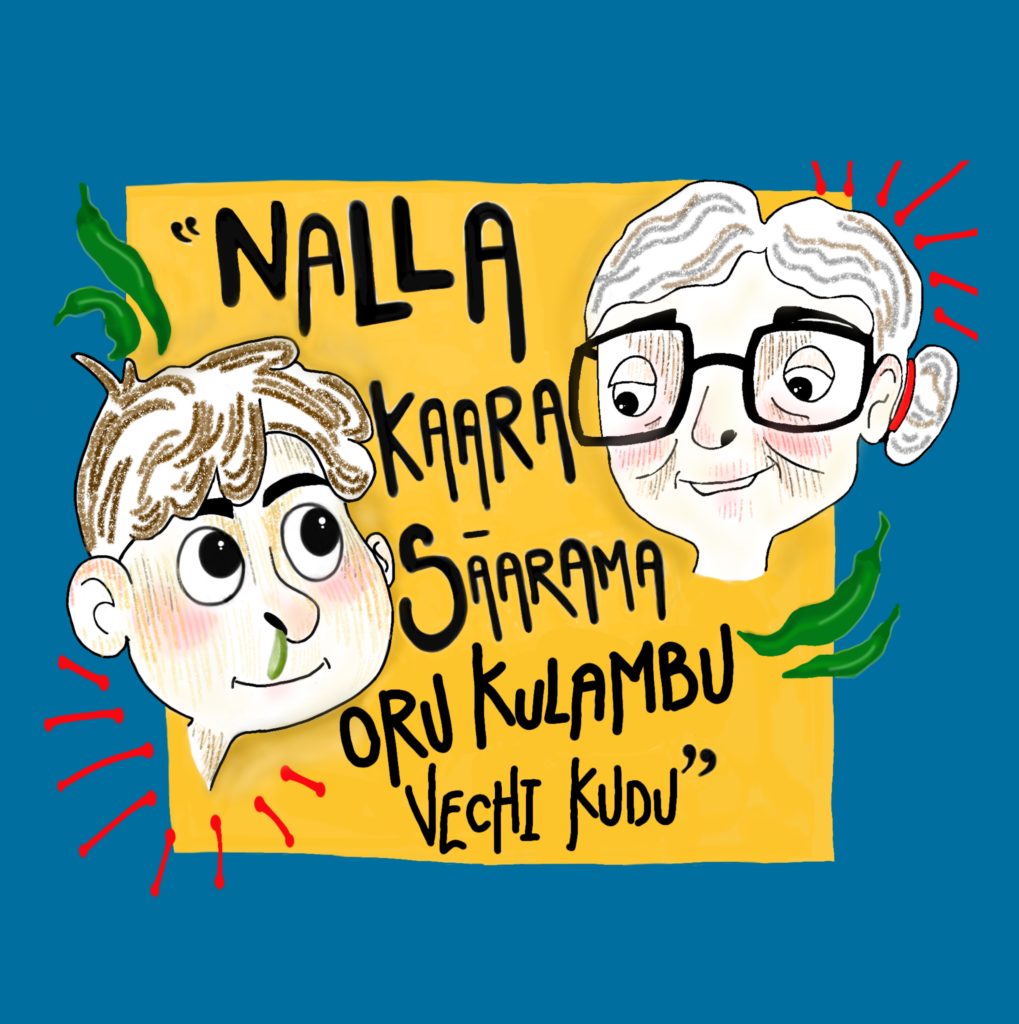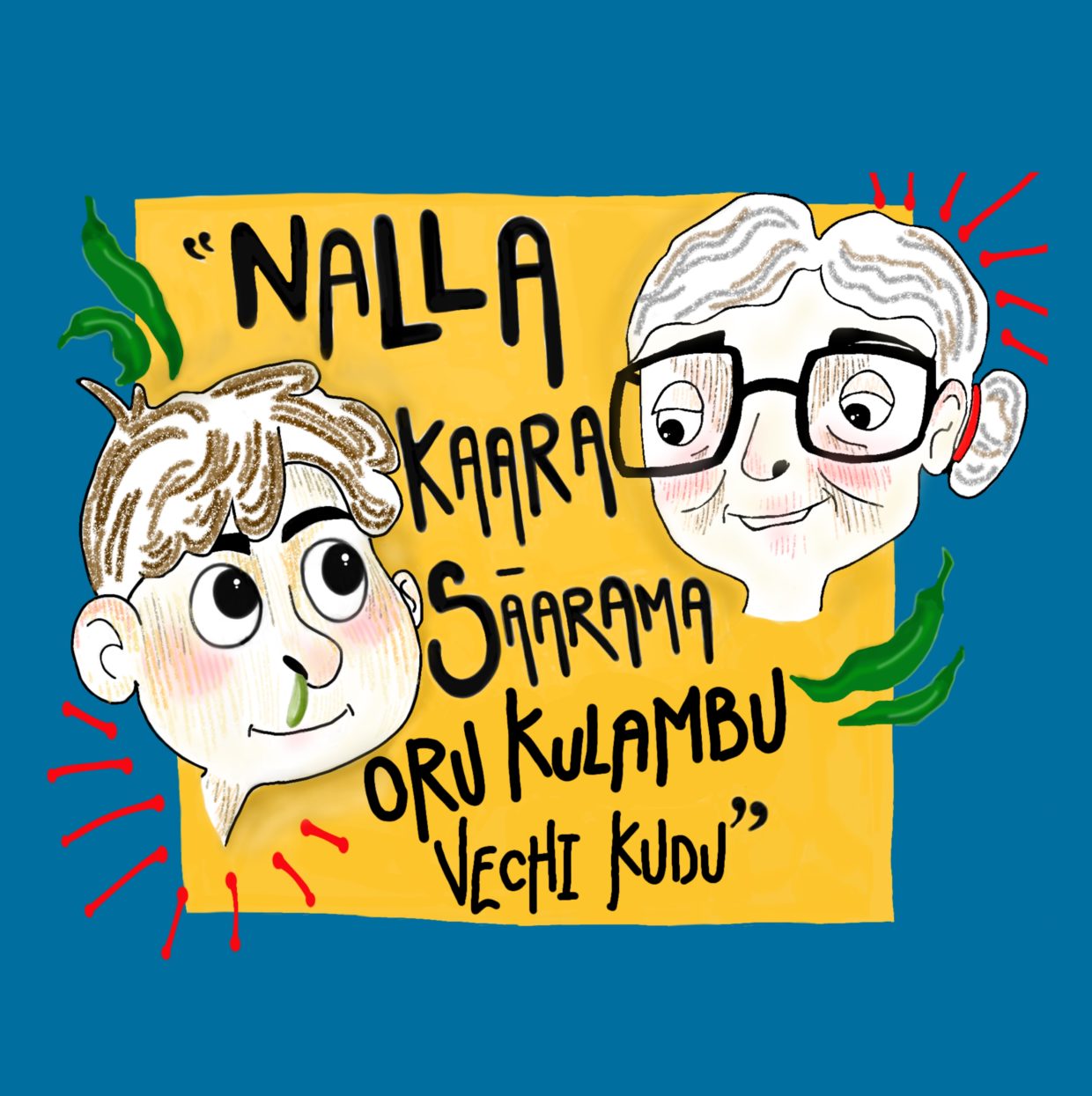This essay by Pranav VS won the second place in the Mother Tongue Essay Contest held in April 2023. The judge, Dipannita Mukherjee, a teacher at Inventure Academy, had this to say, “It was so hard to pick but I went with what made me smile the most (and also hungry).”
I like eating. Amma says I’ve always been a good eater. When I was a baby, barely three months old, Amma made Cerelac and fed me a spoonful hoping I’d take a bite, but to her wonder, I gulped the whole spoon in one go.
“Ai, this baby eats so well!”
She thought to herself and kept on feeding. Until then, she had only fed my two sisters, both of whom shut their mouths so hard that you’d need an industrial-grade plier to separate their lips.
But my memories begin from the time I struggled to eat because my fine motor skills were still in development. I would try to grab the rice but it squeezed out of my fingers; whatever little was left, I’d hurriedly stuff it into my mouth only for some of it to paint my cheeks. I never felt full. So, my favorite meals always came from when I was sick.
Aaya believed that the best way to cure a fever was to scare it out of your body. To scare it with chilli.
“Nalla kaara-saarama oru kulambu vechi kudu” she’d say to Amma. “Keep one nice spicey-tasty kulambu for him”
“Kaara-saarama” sounded to my fevered body as the last bell at school did to my abled body. Not only getting the heat from the “kaaram” but also being promised the tasty with the “saaram,” I didn’t know what the phrase meant in those days when I ate it sitting on Aaya’s thigh, only that when it went in, I felt full and the fever and everything else came out.

Keeping its promise, first came the kaara; the pepper in the mutton gravy would begin wrestling with my nose the moment it arrived on the plate with the steaming rice. Amma’s fingers would cook a little but still manage to deliver the meat and rice into my mouth without any spillover. The chilli would then hit mixed with salt, pepper, ginger-garlic, and meat. It doesn’t take a lot to make meat tasty. After a few mouthfuls, a transparent line of gonney would be flowing down my nose, and Amma would use her other hand to cut it from reaching my mouth and put the goo in a corner of the plate.
“Poduma?”
“Enoughaa?”
She’d ask because I’d be oos-oosing air in to help cool my tongue.
“Illa,” I’d nod sideways.
“Just like his grandfather,” Mom would say with a smidge of pride. Aaya would squeeze me, her pride more than a smidge.
I didn’t know why it made them happy that I ate this kaara-saaramana kulambu. But that mystery began to unravel in the fifth standard when I returned after a long day of PT periods in school, dreaming of the bed, only to see Amma’s yelling spill out on the street. I hurried in to try and muffle the sounds by shutting the gate, but she asked me to leave it open.
The yelling was for Appa, who had allowed the neighbour to park the back portion of his car in front of our compound. But it was also for Mr Kunju, in case he heard.
“Why do you eat all that kaaro (heat) if you don’t have any rosho (righteous anger)?” she asked.
Appa sighed. Amblai yeh amblai (man it seems), she quietly stabbed the phrase in. This angered Appa; he stood up and went straight to his room and shut the door behind him.
It seemed that eating kaaram meant that you had to have rosham. This may seem weird at first, but if you look carefully at the history of the chilli, it begins to make sense.
Aeons ago, when the fruit was just some budding little thing, some curious bird pecked its body and ate a seed. The resulting high, made it come back for more. The chilli quickly understood the effect it had on these flighted creatures and raised the chemical compound causing the high, resulting in a frenzy that spread the chilli throughout South America.
It is this compound known as capsaicin that we’re experiencing when we eat a chilli. It’s not a taste but a sensation of pain. Thus kaaram and rosham. The chilli came to India only in the 16th century, but Amma will not hesitate to ask, “Nobody in your lineage ate kaaram or what?” to Appa, despite his love for eating chilli.
We learnt to eat chilli from him only. He would use his thumb and index finger to dig into the fruit and split it open, then disembowel the seeds to mix with the rice and eat. The resulting hurt felt like BB King singing the “thrill is gone” towards the end of his life when the thrill had indeed gone.
My fascination with this fruit led me to the kitchen. From outside, it seemed to me that the kitchen was not a part of the house but a separate structure. Here, Amma transformed; just five minutes ago there would’ve been a teeth-baring fight with Appa, but the moment she entered the kitchen, a discipline possessed her. I wanted that.
But Amma roadblocked any interest I had in cooking or the kitchen. Nee yenna Pottaya? She would ask if I wanted to cook anything more than eggs. “Amblai doesn’t know how to make kaara saaramana oru kulambu,” I had wanted to say, but never managed the courage. Maybe I needed more kaaram in my diet.
At twenty-two, when I flew out of my house into another city, the kitchen was mine. My lover was repelled by cooking. She lives by the excel sheet. If the youtube video says “Namak swad ke anusar,” she would ask ”whose swad and whose anusar?”.
I, on the other hand, had seen Amma throw in a bunch of things, seemingly at random, and produce a mind-numbing garlic kulambu. So I felt some familiarity with this business of Kaan Aluvu (eye estimate).
I jumped at the chance to try. In the beginning, I would call Amma to ask her for recipes, but she always recited them in a hurry. “Ulindu, kaduvu, seergo, kadale, konjo konjo podu” (white gram, mustard, cumin, and fried chickpeas put little little!). But something was off with my upma. I soon figured out that it was the order of ingredients; the white gram cooked the quickest in oil, so it should go at the end; mine had burnt.
These little seconds and the decisions you make during them were the difference between tasty and edible. With time, you grow familiar with your ingredients, like that mole on your arm you see every day but only look for when it’s vanished.
I longed to share my new expertise with Amma. The first time I cooked pork, I was utterly fida. My friend had warned me, “Don’t put any oil.” “Not even a little?” I had asked. But when I saw the fat turn to liquid and flood the kadai, I was reborn. I ran to my lover and said, “Look! Look! Is there anything more self-sufficient?!” She, who was familiar with pork, and uninterested in cooking looked at me and said, “You’re so cute”.
I called Amma to tell her the same thing. “What kandravi things are you making in the kitchen,” she said with some disgust held back. I had always known, almost as though this knowledge was fed by her hand, that some things weren’t allowed in our kitchen. But It was terrifying to realise how fractured our kitchen was.
I stopped talking to Amma about cooking after that.
My lover was enchanted with my food. She would wait with the eagerness of a cat. Walking up and down the corridor outside the kitchen. It was cooking for her that made me go back everyday. Because after the novelty wears off, a fatigue enters your body. It knows the kitchen means work, and tries to avoid it.
I squished that instinct every time she fell sick. I’d take out the kadai, sputter spices and onions in mustard oil, and then throw in the beef — the slaughter ban in Maharashtra is not really applicable to Kondhwa. As the meat lets out water, crushed ginger-garlic, chopped chillies and the spices should be kept ready. They’ll go in that order, in quick succession. As I said before, it doesn’t take a lot to make meat tasty.
I would be so absorbed in making that kulambu, all my attention would be taken up whether I give it or not. I’d finally wake up only while pouring the kaara-saaramana kulambu on the steaming rice.
My fingers would cook a little while feeding her. But her oos-oosing while still wanting to eat would show me how the kaaram and the saaram have come together. Flavoured like how that phrase flavours my tongue each time I say it. Kaara-saarama.
When she finishes eating, a line of gonney would flow out of her nose. I’d cut it off before it reaches her mouth, and keep the goo in a corner of that plate. I’d wash my hands, serve some rice for myself and pour kulambu on it. The pepper would begin wrestling with my nostril as soon as I sit down to eat. A rush of saliva would flood my mouth, straining the glands. I don’t remember what happens after, only that when I’m done, I always feel the fullness of that five-year-old.
Pranav VS
Latest posts by Pranav VS (see all)
- What is a sakkath voice? Ask better questions, says Rumi Harish - 9th January 2026
- Kaara-saaramana oru Kulambu - 23rd August 2023
- Two notches, with love - 21st April 2021





